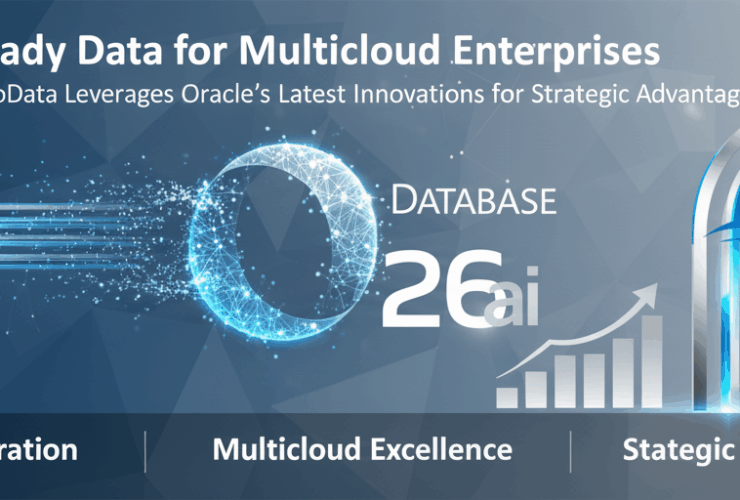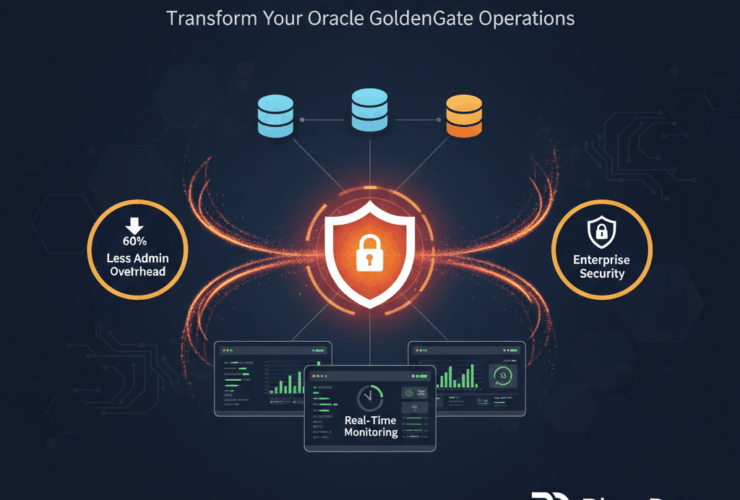Transforming Oracle GoldenGate Operations with AI: Building MCP Servers for Real-World Impact

Remember when everyone said the cloud was just a fad? We’re hearing similar skepticism about AI in enterprise data management today. But here’s what I’ve learned after thirty years in technology leadership: the organizations that dismiss transformative technologies early often spend the most catching up later.
The difference this time? AI isn’t just changing how we work with data—it’s fundamentally reshaping what’s possible when humans and systems collaborate intelligently. I’ve watched teams struggle with Oracle GoldenGate troubleshooting for hours, digging through logs and configuration files, when the right AI integration could surface those insights in minutes.
That breakthrough moment came when we discovered Anthropic’s Model Context Protocol. Suddenly, we weren’t just talking about AI as some distant future capability—we had a practical, secure way to connect AI directly to the enterprise systems our teams use every day.
The Challenge: When AI Meets Enterprise Reality
Walk into any enterprise data center, and you’ll find the same frustrating disconnect. Marketing teams are buzzing about AI transformation while database administrators are still manually checking replication lag at 2 AM. The promise is compelling, but the execution? That’s where most organizations stumble.
I’ve seen too many AI projects that look impressive in demos but crumble under real-world operational pressure. Teams invest months building fragile custom integrations that break every time Oracle releases an update. Meanwhile, the DBAs who could benefit most from AI assistance continue working with the same tools they’ve used for years, waiting for someone to bridge that gap between possibility and practicality.
Oracle’s microservices framework already gives us solid programmatic access through REST APIs. We can automate deployments and monitor replication status dynamically. But imagine if your database administrators could simply ask, “Which extracts are running slowly today?” and get immediate, accurate answers from live system data.
The Model Context Protocol: Finally, a Standard That Makes Sense
At Google NEXT this year, when Anthropic announced the Model Context Protocol, I knew we’d found something different. This wasn’t another flashy AI demo—it was a practical solution to the standardization problem that’s been holding back enterprise AI adoption.
Think of MCP as creating a universal connection standard between AI and your existing infrastructure—like how USB-C eliminated the chaos of proprietary cables. One standardized interface that works across different AI platforms and evolves with your systems.
But here’s what makes MCP genuinely powerful for enterprise environments: it respects your security boundaries. Instead of training AI models on sensitive data, MCP lets AI access live information through controlled, secure interfaces. Your critical data stays exactly where it belongs while AI gains the context it needs to provide meaningful assistance.
Building MCP Servers That Actually Work in Production
Let me show you how we approach MCP development for Oracle GoldenGate, using principles that work for any enterprise system integration.
The architecture starts simple but reflects years of hard-won lessons about enterprise integrations:
# server.py - Your integration foundation
import sys
from mcp.server.fastmcp import FastMCP
mcp = FastMCP("GoldenGateMCP")
# main.py - Your execution entry point
from server import mcp
if __name__ == "__main__":
mcp.run(transport='stdio')
This foundation looks straightforward, but what’s happening underneath reflects everything we’ve learned about building systems that teams can depend on. Clean separation between configuration and execution makes managing different environments infinitely easier.
Tools That Solve Real Problems
The real work happens when you build tools around business operations, not just technical functions. Here’s how we structure our Oracle GoldenGate integration:
class GoldenGateOperations:
def __init__(self, config: dict = None):
if config is None:
from config_loader import load_config
config = load_config()
# Secure configuration management
gg_config = config["golden_gate"]
self.host = gg_config["host"]
self.username = gg_config["username"]
self.process_configs = gg_config["processes"]
async def get_process_status(self, process_type: str):
"""Retrieve real-time status for GoldenGate processes"""
if process_type not in self.process_configs:
available_types = list(self.process_configs.keys())
raise ValueError(f"Process type '{process_type}' not configured. Available: {available_types}")
# Secure API interaction with proper authentication
config = self.process_configs[process_type]
url = f"http://{self.host}:{config['port']}/services/v2/{config['endpoint']}"
# Enterprise security practices
auth_credentials = f"{self.username}:{config['password']}"
encoded_auth = base64.b64encode(auth_credentials.encode()).decode()
headers = {"Authorization": f"Basic {encoded_auth}"}
response = requests.get(url, headers=headers, verify=False)
return json.dumps(response.json(), indent=2)
See what we’re doing here? Configuration stays external, authentication follows security best practices, and error handling gives clear feedback. These aren’t just coding preferences—they’re operational necessities when building systems that teams will stake their reputation on.
Natural Language for Operations Teams
The transformation happens when you expose these capabilities through conversational interfaces:
@mcp.tool()
async def get_extract_status():
"""Check the current status of all extraction processes"""
return await gg_operations.get_process_status("extracts")
@mcp.tool()
async def get_replicat_status():
"""Monitor replication process health and performance"""
return await gg_operations.get_process_status("replicats")
Suddenly, your operations team can ask “Are all our extracts running normally?” and get immediate answers based on live system data. That’s when AI stops feeling like a science project and starts delivering real value.
Strategy Beyond the Code
Building the MCP server is the foundation, but successful implementation requires thinking strategically about how teams actually work.
Enhancing Existing Workflows
The most successful AI implementations enhance established processes rather than disrupting them. Your database administrators already have proven workflows for monitoring GoldenGate environments. Smart MCP servers accelerate these processes without forcing teams to abandon what’s already working.
Starting with monitoring and status checking creates immediate value while building confidence. Teams can verify AI responses against familiar tools, gradually building trust in the system.
Security That Actually Works
Enterprise AI demands enterprise-grade security from day one:
- Credential Management: Enterprise-grade secrets management, never hardcoded passwords
- Network Security: Proper network segmentation and access controls
- Audit Logging: Complete tracking of all AI interactions with enterprise systems
- Data Governance: AI interactions that comply with organizational data policies
Getting Teams on Board
Technical implementation is often the straightforward part. Real success requires thoughtful change management:
- Start with Power Users: Find team members comfortable with new technology who can become advocates
Demonstrate Clear Value: Show concrete time savings and improved accuracy, not just impressive technology
Provide Fallback Options: Teams need confidence they can perform critical tasks even if AI systems are unavailable
Iterate Based on Feedback: The best implementations evolve based on real user experiences
Connecting to Production Systems
Once your MCP server is tested and ready, connecting it to platforms like Claude Desktop requires attention to operational details.
Configuration management becomes critical here. Your claude_desktop_config.json should reflect organizational deployment standards:
{
"mcpServers": {
"GoldenGateOperations": {
"command": "/opt/python/bin/uv",
"args": [
"--directory",
"/opt/mcp/goldengate-server",
"run",
"main.py"
]
}
}
}
Use absolute paths, establish consistent deployment locations, and ensure your configuration integrates with existing DevOps processes. These operational details determine whether your solution scales across the enterprise or remains a clever proof of concept.
What Success Looks Like in the Real World
When MCP servers work effectively, they transform how teams interact with complex enterprise systems. Here’s what we’ve observed:
- Faster Problem Resolution: Database administrators diagnose replication issues in minutes instead of hours, using natural language queries to quickly identify bottlenecks and configuration problems.
- Better Team Collaboration: Operations teams share system status and troubleshooting insights more effectively when AI provides context-rich explanations of system behavior.
- Smarter Decision Making: Managers get real-time operational insights without needing deep Oracle GoldenGate expertise.
- Reduced Learning Curves: New team members become productive faster when they can ask systems questions in plain English.
The Bigger Picture
MCP servers represent more than just another integration approach. They signal a fundamental shift toward more accessible, context-aware enterprise operations.
Organizations wrestling with complex data architectures and the demand for real-time operational intelligence will find standardized protocols like MCP becoming essential infrastructure. Teams that embrace these approaches early gain significant competitive advantages in operational efficiency and system reliability.
The key? Approach these implementations with the same discipline and strategic thinking you’d apply to any critical enterprise system. This isn’t about experimenting with AI—it’s about building production-ready solutions that genuinely enhance your team’s capabilities and improve business outcomes.
Summary
Building MCP servers for Oracle GoldenGate operations demonstrates a practical approach to enterprise AI integration—one that delivers immediate value while establishing the foundation for broader transformation initiatives.
The technical implementation is straightforward when you apply proper architectural thinking and enterprise-grade practices. The real value emerges when operations teams can interact with complex systems using natural language while maintaining security, reliability, and compliance.
Success requires balancing technical capabilities with thoughtful change management, ensuring AI enhancements integrate seamlessly with existing workflows and team practices. Organizations taking this measured, strategic approach build AI capabilities that scale across their enterprise architecture while delivering measurable operational improvements.
The question isn’t whether AI will transform enterprise data operations—it’s whether your organization will lead that transformation or spend years catching up. MCP servers provide a clear, practical path forward for teams ready to bridge the gap between AI potential and enterprise reality.
What’s our objective here? Clear communication, team success, and technology that serves the mission. That’s strategic AI integration in practice.
Ready to Transform Your Enterprise Operations?
At RheoData, we’ve built MCP servers and AI integrations for some of the most demanding enterprise environments. We understand the difference between impressive demos and production-ready solutions that your teams can depend on.
Whether you’re looking to enhance Oracle GoldenGate operations, integrate AI with other enterprise systems, or develop a comprehensive AI strategy that aligns with your business objectives, our team brings the architectural expertise and operational experience to make it happen.
Let’s coordinate on your next AI integration project. Contact us to discuss how MCP servers can transform your enterprise operations while maintaining the security, reliability, and performance your business demands.
Ready to get started? Reach out to cloud@rheodata.com or visit rheodata.com to learn more about our enterprise AI integration services.
Your success is our success. Let’s build something remarkable together.


